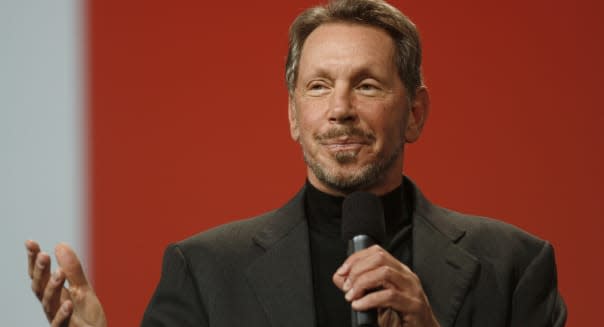Why Oracle CEO Larry Ellison's Big Pay Cut Isn't as Altruistic as It Looks

Bloomberg recently reported that Oracle (ORCL) founder and CEO Larry Ellison saw an 18 percent drop in his pay during fiscal 2013 after he "gave up an annual bonus and the company missed some of its profit targets."
This seems even more impressive, considering that Ellison collects a base salary of just $1.
But if you dig a little deeper, you'll discover that his pay cut wasn't all that altruistic. You see, he still earned $78.4 million last year.
Dissecting Ellison's Pay Stub
The bulk of Ellison's pay comes in the form of stock options, which totaled $76.9 million when they were issued last year. Stock options are a common form of CEO compensation. When issued prudently, they can keep an executive's interests aligned with those of shareholders.
But Ellison already has a vested interest in Oracle. He founded the company and still owns a hefty 25 percent of it -- a stake currently valued at $36.9 billion.
The rest of Ellison's compensation comes via 401(k) contributions ($5,134), benefit plans such as life insurance and long-term disability ($6,122), legal counsel ($2,999), his family's use of aircraft ($85,894), and lastly, security-related costs (more than $1.5 million).
Most of these perks are common for CEOs. But, taken together, Ellison's benefits are high -- especially considering his wealth.
Ellison holds the title of the third-richest American, according to Forbes. And his name regularly appears near the top of "highest-paid CEOs"lists. Heck, he even owns a Hawaiian island.
Needless to say, given Ellison's embarrassment of riches, the extra stock option grants seem excessive.
When Enough Is Enough
Having the financial priorities of management aligned with the performance of the company is certainly a trait investors like to see. But there is a point where adding any more zeroes to an already-wealthy CEO's paycheck is absurd.
%VIRTUAL-article-sponsoredlinks%There are business leaders who, based on their more shareholder-friendly pay packages, recognize this. Like Ellison, some of these CEOs also take home a token $1 a year in salary. But beyond that, the compensation packages vary widely.
John Mackey, CEO of Whole Foods Market (WFM) is part of the $1 salaried CEO club. He also receives no stock options and no bonus. In fact, his only additional compensation was $69,018 in accrued vacation time. Even more impressive are Larry Page and Sergey Brin, co-founders of Google (GOOG). Each of these gentlemen takes home just $1 in salary. And that's it -- no other perks.
Of course, it's not necessary to have a $1 salary for a compensation package to be shareholder-friendly.
Jeff Bezos, CEO of Amazon.com(AMZN) takes home an $81,840 paycheck annually. His only other compensation is $1.6 million for home security (which is a little high, but his overall compensation is still quite low compared to Ellison's). Berkshire Hathaway's (BRK-B) Warren Buffett takes home a salary of $100,000, with his only additional compensation coming in the form of a $323,000-a-year security detail.
Why This Is Something to Pay Attention To
It's important to look at an executive's compensation package because it gives you insight into how they view their role. Are they merely trying to get even wealthier by designing excessive compensation packages or getting the company to fund lavish perks? Or are their interests clearly aligned with shareholders, because their income relies on owning a good chunk of shares, and they eschew lofty options grants?
What's more, when considering shareholder-friendliness, it's important to look at more than just the salary.
Often, as is the case with Larry Ellison, excessive packages come in the form of lofty bonuses, stock options, and other perks -- perks a CEO who truly cares about building shareholder value should fund out of his own already-deep pockets.
Motley Fool contributing writer Adam J. Wiederman has no position in any stocks mentioned. The Motley Fool recommends Amazon.com, Berkshire Hathaway, Facebook, Google, and Whole Foods Market. The Motley Fool owns shares of Amazon.com, Berkshire Hathaway, Facebook, Google, Oracle, and Whole Foods Market. Try any of our newsletter services free for 30 days.

